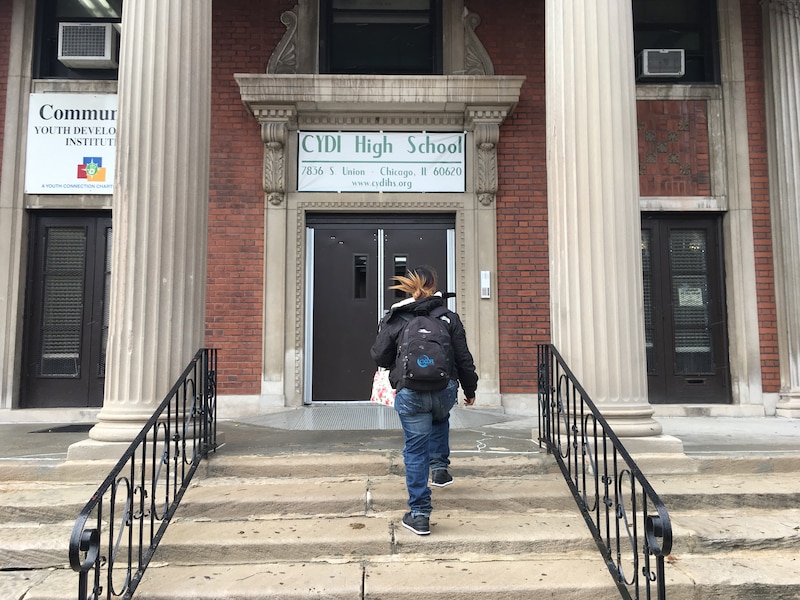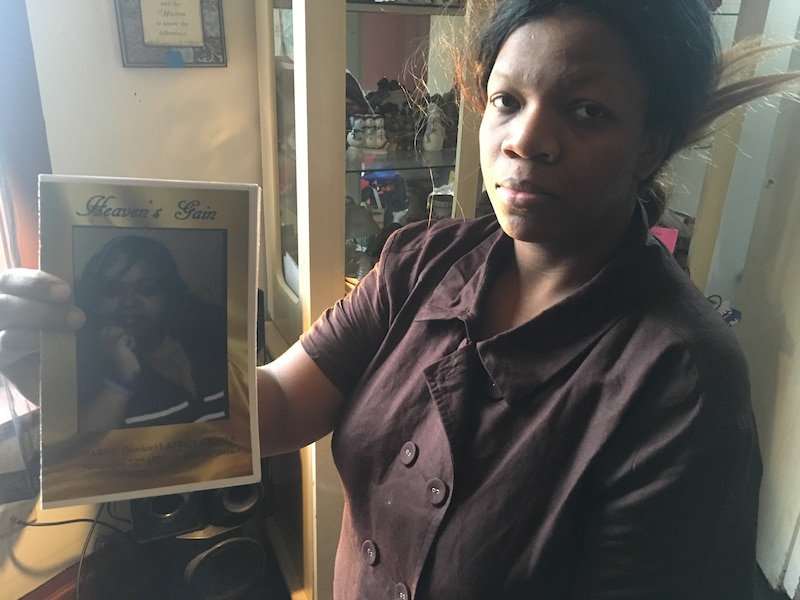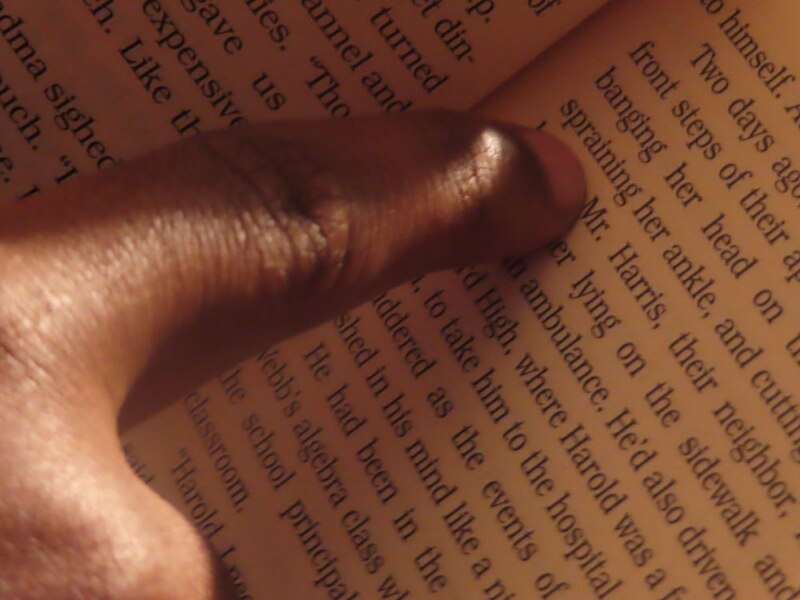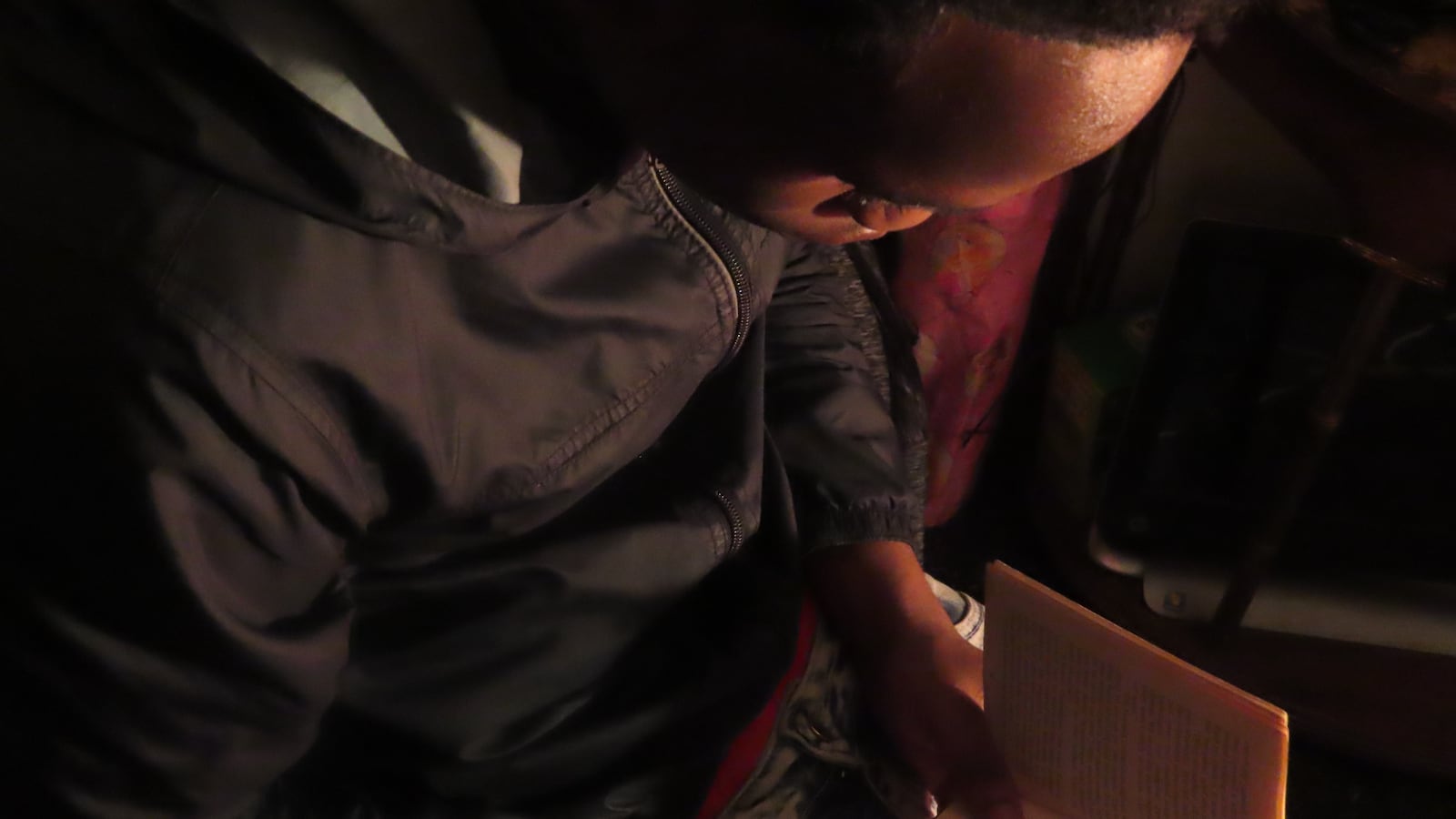Javion Grayer’s aunt had given him the book thinking he might connect with the main character: a black teenager in crisis, struggling to make the right choices at school and evade trouble in a neighborhood affected with violence.
But two months after receiving “No Way Out,” 16-year-old Javion was still on the third page. Written at a third-grade level, the novel was too difficult for him to read.
He opened the book.
“Two days ago,” he started, “Grandma fell on the ….” He paused. “Front,” he said, and then “steps.” He skipped the next word, “banging,” then continued.
“Her head on the … porch,” he said, substituting another word for the correct one, “pavement.” Instead of the next two words, “spraining her,” Javion read “straining her.”
Then he looked up at his aunt, Katrina Falkner, with pleading eyes and turned the book her way, pointing at a word. “Ankle,” she whispered. He repeated it like he was weighing a question, and nodded.
Javion worked his way down the page, brow furrowed, stopping at or skipping over what he couldn’t understand. After five minutes, halfway through the page, he closed the book, exhausted.
“I can read some of it,” he said. “But I can’t read all of it, it’s a little too hard. I need help.”
It’s an assessment that everyone in his life shares — from his aunt, who became his legal guardian when his mother died two years ago, to his teachers at the small alternative high school he began attending this fall.
Related: Chicago schools don’t have a plan for teenagers who struggle to read
They know the stakes are high. An estimated three in 10 adults in Chicago lack basic literacy skills. They are more likely to earn lower wages, face unemployment, wind up in jail, and be mired in poverty than are adults who read well. Javion has little more than a year to avert becoming part of that statistic.
How Javion became a high school student reading at the second-grade level is impossible to say for sure. But multiple forces play a role: Intergenerational poverty and violence abetted by segregation and disinvestment that have strangled opportunities for black families in neighborhoods on the South and West Sides. Underperforming schools concentrated in underserved communities. A special education system that avoided serving students. A patchwork approach to literacy instruction.
And thousands upon thousands of students like Javion, who have endured deep, searing losses and trauma.
“Things he may have missed.”
Javion was born at Saint Anthony Hospital on New Years Day 2002 to Margie Grayer. His birth certificate doesn’t list a father. Grayer, then a 26-year-old receptionist, lived with her three other children; her younger sister, Falkner; and two teenage cousins in a three-bedroom apartment at the Robert Taylor Homes in Bronzeville, a notorious public housing development forged from racist housing policies that reinforced segregation and further concentrated poverty on the South Side.
Chicago was already in the process of demolishing the neglected and crime-ridden housing project, so after Javion arrived, the family moved five miles south to Englewood, another segregated black community struggling with poverty and crime.
From kindergarten to second grade, Javion attended Woods Elementary Math & Science Academy, which was later closed for low performance and underenrollment. He missed many days of school, according to school records, and was forced to repeat second grade.
Related: I’m a Chicago teacher who has watched many Javions fall through the cracks. Here’s what would help.
Grayer transferred Javion to Bass Elementary School a half a mile away. He passed second grade there, but was asked to repeat the third grade.
That happened at a third school, Stagg Elementary School in Auburn Gresham. The family moved there after a gunman on a bike shot and injured Javion’s two older brothers, then 15 and 16. They survived.
Javion arrived at Stagg just as it was undergoing a “turnaround,” a handoff to outside management and an often turbulent transition, designed to raise test scores at chronically underperforming schools. Stagg promoted Javion every year. At his mother’s request, the school evaluated him for the first time — in seventh grade — for special education services. That year, 87 percent of his fellow seventh graders were reading below level. Javion’s assessment found a mild intellectual disability, according to school records.
After that, Javion remembers, a dedicated aide started joining him in class once a day.
“She was the one lady who would help me a little, she would sit in the classroom and teach me how to read a bit and then she would leave,” Javion said.
But after a brief stretch of progress came calamity. Javion’s mother became ill and died suddenly the summer after he finished seventh grade. From tenuous stability, his life spun into turmoil that he could recount only much later.
Schoolwise, Javion thinks he didn’t get any one-on-one help during eighth grade. Nor did he get any at Wendell Phillips Academy High School in Bronzeville, which he entered in 2017, around the time that he moved in with Falkner. He left that school after only a few weeks because of the long commute, transferring to Excel Academy, an alternative school in Englewood.
There, according to records, he participated in most courses, without any special accommodations beyond getting extra time and guidance from his teachers. The school determined that his disabilities didn’t require direct services from a special education teacher, although his teachers were supposed to consult with those specialists quarterly. The report cautioned that Javion had missed so much school — 16 of the first 42 days of the year — that the assessment could be incomplete.
This year, Javion started at a third high school, Community Youth Development Institute, where his annual meeting to review and update special education services took place this month, nearly halfway through the school year.
On the day that Javion’s evaluation team planned to share their conclusions, his aunt walked up the Auburn Gresham school’s steps seeking answers for her nephew.
“I’m just hoping somebody will finally help him out,” she said.

When she entered the counselor’s office to discuss an individualized education program, Javion already was sitting in the cramped room with three women — a case manager, a psychiatrist, and his special education teacher — tossing a plastic stress ball into the air.
For the IEP meeting, the school had sized him up. Karen McDillon, the school psychiatrist, described Javion as pleasant, respectful, cooperative and “very soft-spoken.” She said he has many friends at the school, thrives socially, and despite his deficits, has strengths. He’s a strong visual learner who responds well to charts, favors nonverbal reasoning, shows willingness to learn, and benefits from individual explanations and coaching.
But she said his reading scores from October placed him at the level of a second-grader. He struggles with how to decipher the individual sounds in a word and combine them. Word parts, prefixes and suffixes confuse him. Many of his reading errors come from dropping syllables or assigning incorrect vowel sounds to unfamiliar words.
However, evaluators finally have arrived at a welcome explanation for Javion’s struggles.
“We’re feeling that’s not so much a reflection of his ability,” said his case manager, Nancy Bobel, “and is more of an issue of things he may have missed early on in his education.”
Special education problems
It’s unclear why Javion seems not to have been screened for special needs until seventh grade.
His current IEP team believes that his seventh-grade review missed addressing his gaps, and that he should have been evaluated early in elementary school.
That 2015 diagnosis identified him as having a cognitive impairment or intellectual disability, meaning that his capacity would be limited. But he’s made so much progress recently, in less than a semester, that Bobel said, “We’re changing his disability label to a learning disability, which means he has the capability of learning much more than what was originally thought.”
How could Javion repeatedly fall through the cracks?
Chicago Public Schools declined to respond to multiple queries related to Javion’s education. A spokesperson also declined to explain the district’s approach to teaching reading to older students like him who struggle to read.
If indeed the district neglected to provide Javion early on with special education, he wasn’t the only student who missed out.
A state investigation found in May that Chicago schools systematically shut out qualifying students from special education, by failing to train staff, improperly assessing students, and sending parents conflicting information, all in violation of state and federal laws. The state assigned a monitor to oversee the program, but parents and advocates still say that improvements have been slow to appear.
None of that has surprised parents and groups like Community Organizing and Family Issues on the Near West Side. Falkner joined the group even before she became Javion’s guardian, and attended training in leadership special-education advocacy. Buoyed by what she learned, she nudged her sister to push the school to evaluate Javion’s needs.
In July, at a Chalkbeat forum with caregivers at the organization, Falkner told a table of mothers, grandmothers and aunts about Javion’s reading challenges.
When she finished, there was barely a dry eye left among the group.
Javion now receives more than four hours a week of special help for all core subjects, and spends nearly two-thirds of his school time away from regular classes. A low student-teacher ratio offers more individual attention and fewer distractions, according to his evaluation.
And the school responded to Falkner’s demand to focus more on his reading skills to accelerate his fluency and comprehension.
“Hopefully, now that he’s going to be receiving services all through high school, we’ll be able to get him caught up to a level where he can function independently on his own in the world,” said school psychiatrist McDillon.
A late intervention
Catching up depends on Javion becoming a better reader.
He remembers failing reading assignments from an early age, and zoning out when he couldn’t read a worksheet or passage in a text. He doesn’t have a favorite book or writer. He also said he has always shied away from reading aloud in class.
“Some of it, I can get through it, but some of it I can’t. So I don’t like reading in front of other people,” Javion said.
As kids get older, catching up becomes much harder. After third grade, classroom instruction tends to move away from teaching students how to read and toward asking them to read in order to learn new material about other subjects.
But Javion lacks the skills to do that effectively.
He’s hardly alone in moving ahead in school without mastering phonics. It’s possible his teachers never taught it. In teaching reading, many schools across the nation have pushed “whole language” over sounding out words. Instead, students learn to use pictures or context clues to fill in ideas.
Whether Javion’s elementary schools did that is not certain. Since at least the early 2000s, Chicago has increasingly moved toward giving principals a wider degree of autonomy to choose what and how students are taught.
When Tim Shanahan became director of reading for Chicago Public Schools in 2001, he asked for a list of the reading programs used at schools — “and they literally gave me two stacks of paper that went from the floor to the top of my desk.”
As he went through the stack, he said, “there were schools that didn’t have any program, and schools that have as many programs as you can imagine.”
A struggling reader who moves from school to school and gets direction that conflicts with what they have heard before might become frustrated and resistant to reading, said Shanahan, who is no longer with the district. He said the impact of Chicago’s scattershot approach to literacy instruction would be heightened for students like Javion who attend multiple schools in the pivotal early years.
Javion’s current school has an approach, but not a curriculum. Community Youth Development Institute is an alternative charter school enrolling 180 or so students ages 16 to 21. True to its start by a pastor and his wife in 1996, the school is operated in an old church building. Nearly all students are black, and from low-income households in and around communities like Auburn Gresham and Englewood.

The school relies on a “personalized learning” model — mostly computer programs — to help students catch up. For Javion, that means working with a popular reading remediation program called Read 180, meant for students whose reading skills are several years behind.
It also means taking small-group classes with Kelly Morgan, the school’s sole special education teacher, who said she is building her curriculum “from scratch” based on their needs. Morgan has Javion working on learning common prefixes and suffixes so he can grow the number of words he can identify.
The special education team, which creates individual plans for all 30 of the school’s students with disabilities, also prescribed working on a page of the dictionary every day to build his arsenal of familiar words and practicing filling out job applications to tie lessons back to the real world. Those tasks, they said, would help Javion become a better reader.
“As he builds his vocabulary and his ability to decode, and to learn those sight words, then his fluency and his comprehension will improve,” said Bobel, his case manager.
Louisa Moats, a leading national expert on literacy, said that it’s unlikely Javion was ever taught to read properly if he’s reading at a second grade level. She suggested that even older students trying to learn how to read need to start at the beginning with phonics — putting letters and sounds together to make syllables that go into bigger words. Then, for practice, a student like Javion needs intensive instruction with a trained and supervised teacher.
Moats said research indicates Javion would require at least three hours of instruction a day taught by trained teachers. Half of that time would be the mechanics of reading, and the other half he’d need to make up what he’d missed in math and other subject areas, “because if he can’t read it means he’s probably way behind in his general knowledge,” Moats said.
“I’m not ashamed.”
At the IEP meeting, there’s some news. In less than one semester, Javion’s reading skills increased half a grade level, according to a STAR reading assessment administered in October — something that has likely has never happened for him before. The school special education teacher, Kelly Morgan, said she’s optimistic that he’ll continue to gain.
“I think he has a lot of potential,” Morgan said. “He’s a very intelligent young man, he’s very dignified, he’s very quiet, very thoughtful. I think that he just needs a little fine tuning in some areas, but he’ll be OK.”
Still, the odds are stacked against Morgan’s efforts, and Javion’s. In addition to starting from a deep skills deficit, Javion must contend with other ongoing challenges.
At the epicenter of those challenges has been his mother’s sudden death two years ago. In July 2016, Margie Grayer complained about shortness of breath. Her children urged her to go to the hospital. She refused for a week, Javion said, but finally went on Aug. 1. She died of pneumonia 10 days later.

Javion recalls his brother shaking him awake in bed to tell him the news. The family gathered at the hospital and cried at her bedside.
“It wasn’t anything going through my mind. I was just hurt,” Javion said. “I didn’t want to talk to nobody.”
“Now I try not to think about her, because if I think about her, I might cry.”
After Grayer’s death, her former boyfriend — the father of two of Javion’s siblings — cared for Javion and the other children. But in September 2017, the man vanished without an explanation.
That hurt, Javion said, because they were close, much closer than Javion and his biological father, who rarely shows his face. Javion does not know why he left or where he went, just that the lights were off and no food was in the fridge when he abandoned them.
That’s when his aunt took in Javion and his younger sister. But Falkner has her hands full. She’s also a foster mother to 10-year-old twins. They all live on a quiet block in Englewood, surrounded by vacant lots. Falkner volunteers with various community groups, and coordinates mentoring and education activities for area youth via her nonprofit 66th & Union Life Crew.
She works temp jobs. She spends a lot of time navigating the maze of guardianship and public benefits for the kids.
But Falkner has been able to advocate for Javion and his siblings. Still, she fears family history is repeating itself in Javion.
Falkner’s mother was functionally illiterate — meaning she lacked the reading and writing skills to meet everyday needs — like one of Falkner’s younger brothers.
“He’s 34, and he still needs help,” she said.
For Javion, other traumas followed his mother’s death. In December 2017, Javion and several companions narrowly survived a shooting connected to clashes with students from his former high school. Falkner said it was gang-related, but not directed at Javion. The shooting prompted Falkner to switch Javion’s school — the second time he transferred after a shooting.
Just three months later, in February, his 15-year-old cousin was shot to death on the South Side.
Javion’s life reflects the perfect storm that Alfred Tatum, dean of the college of education at the University of Illinois at Chicago, said young black men weather in Chicago and across the nation. An activist for black male literacy, Tatum says a lack of culturally responsive instruction, achievement struggles, and disproportionately high rates of school discipline together prevent black boys from succeeding in school — and having positive life trajectories.
“Those are triple threats that become a very dark abyss,” Tatum said.
“Young black men are not going to sit in classrooms where they don’t experience good things, and it’s hard to experience positive experiences in classrooms when you cannot read well.”
Javion’s special education plan puts him on track to graduate in June 2022, when he will be 20. He didn’t come to the school with a single credit earned.
Remarkably, despite the trauma, loss and turmoil in his life, Javion is upbeat. He’s getting counseling at school to help him deal with his grief now. He’s driven to improve as a reader, and remembers what his mom told him.
“She told me to read,” he said. “Because one day you might be able get a good job or anything. You can get anywhere. You can start your own business if you know how to read. I’m going to try to start my own business one day, designing clothes.”

That’s why on the eve of Thanksgiving, the day before what would have been Margie Grayer’s 43rd birthday, Javion woke up in bed with a purpose.
He joined the other kids for breakfast, and afterward, he and his cousin Myshayla, 9, walked to the living room of their Englewood apartment and browsed through the bookcase.
Javion grabbed “No Way Out,” the book he had struggled so mightily with a couple weeks earlier. Myshayla is the house’s resident whiz kid, and one of the only people who regularly reads one-on-one with Javion.
She watched intently as he started off where he stopped before.
This time, he’s able to finish the page.
“I’m not ashamed,” Javion said proudly. “I just want to get better.”


